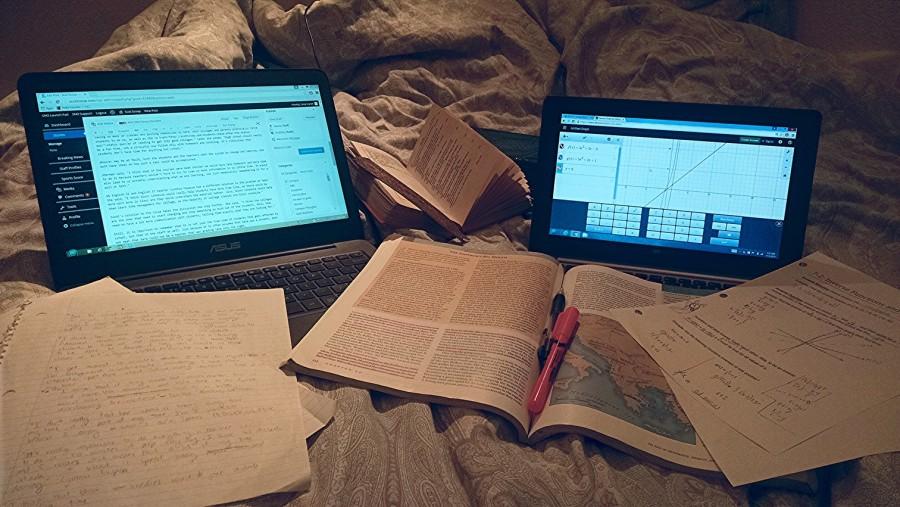Sara gently stroked the white, silk-soft mane of her unicorn, letting out a laugh as it neighed. She walked over to its right side and put her foot in the stirrups, preparing to mount it, when she realized something was wrong.
In the distance, she could hear a faint beeping noise, over and over again.
Could it be… an alarm clock?
Upon thinking so, Sara was imminently torn away from her one-horned friend and back to reality. Her head was laying on a math book and worksheets were spread all around her, her alarm clock continuing its obnoxious beeping as it flashed 1:23 a.m.
Believe it or not, there’s quite a lot of students that frequently end up in similar situations to Sara’s — working on schoolwork until the early hours of the morning, ultimately having little to no time to themselves.
Sophomore Daisha Sherman said, “School shouldn’t take up so much of my time that I only get 30 minutes to myself. It’s truly ridiculous that I am unable to do the things I have a passion for.”
Another example is junior Sophie Zhai, who is currently taking five AP classes. Zhai said, “To put it simply, I don’t have any free time at all. School is just a constant stream of homework.”
But who is at fault for the lack of free time students have because of school?
AP European and US history teacher Jayson Waller said, “The blame ultimately falls on the students. Advanced classes are not mandatory; no one is forcing students to take all AP classes. It is up to them to be able to decide if they can handle all those classes or not.”
However, some people have a different opinion on the issue, saying that the fault lies with society, not the students.
Language teacher Roberta Scott said, “I think the culture that we live in is at fault for students taking so many AP classes and pushing themselves so hard. Both colleges and parents practically force students to do so, as well as the status quo of needing to get into good colleges.” Later she added, “High school should really be a fun time, not a stressful one filled only with homework and studying. It’s ridiculous that students don’t have time for anything but school.”
Whoever may be at fault, both students and teachers think that the system could change and improve, and both have ideas on how such a task could be accomplished.
Sherman said, “I think that if the course [material were cut down], we would have less homework and more time to do it because teachers wouldn’t have to try to cram so much information in so little time. It would also lead to us actually understanding what we are learning, not just temporarily remembering it for a quiz or test.”
AS English II and English IV teacher Cynthia Faupusa had a different solution to the problem. She said, “I think block schedule would really help students have more free time, as there would be more work done in class and they would understand the material better. Also, block schedule would help them learn time management for college, as the majority of college classes are block schedule.”
Some people take the discussion one step further, saying that it is colleges that need to step in and solve the issue.
Scott said, “I think the colleges are the ones that need to start changing and stop demanding so much out of the students. Also, they need to have a lot more communication with students, telling them exactly what they are looking for.”
Still, it is important to remember that it is not just the free time of students that is affected by school, but that of the staff as well. Just because it is often assumed that Sara was a student, does not mean that Sara could not be a teacher that was grading late into the night.
Faupusa said, “It’s impossible to finish all my work, especially grading, in the 100 minutes of prep time I get every day. I have 168 students, which means I have 168 papers or essays to grade, each one taking about 20 minutes. Plus, every time I want to do something a bit more special in my classes, I have to plan it outside of school. It really takes away from my free time.”
In the same vein, Scott said, “I always have a stack of papers to grade that I carry around with me wherever I go because, as a teacher, I never really stop grading. It’s quite sad.”
Nevertheless, not all of the school’s staff is under the same regime of barely doing anything else apart from schoolwork.
Kristin Vernon, one of Carlmont’s counselors, said, “A lot of times I work after school with students that need any sort of personal, emotional, or academic guidance and help. However, I usually do not do any work once I leave the school campus.”
An even more relaxed attitude comes from substitute James McDowell, who said, “I don’t really feel like school is taking away from my free time because it is part of my free time. I’m a substitute because I enjoy working with kids and helping them, not because I have to.”
Either way, as Faupusa said, there is no doubt that “school is time consuming and demanding, and it [can require] a lot of self-sacrifice in order to be done right.”

